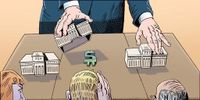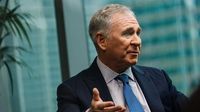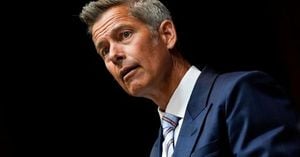In a rare public rebuke from the upper echelons of American finance, Ken Griffin, the billionaire CEO of Citadel, has issued a stark warning to President Donald Trump: stop interfering with the Federal Reserve. Griffin, joined by Anil Kashyap, a professor at the University of Chicago Booth School of Business and consultant to the Chicago Fed, outlined his concerns in a pointed op-ed published in The Wall Street Journal on September 7, 2025. Their message was clear—Trump’s campaign to pressure the Fed to lower interest rates not only risks stoking higher inflation, but also threatens to erode decades of hard-won credibility for the U.S. central bank.
This public admonition stands in sharp contrast to the general silence of the U.S. business community. While many CEOs have steered clear of criticizing the president’s approach to monetary policy, Griffin broke ranks, warning that Trump’s actions could have unintended and far-reaching consequences. “The president’s strategy of publicly criticizing the Fed, suggesting the dismissal of governors, and pressuring the central bank to adopt a more permissive stance toward inflation carries steep costs,” Griffin and Kashyap wrote in their op-ed, as reported by Quartz. “These actions raise inflation expectations, increase market risk premiums, and weaken investor confidence in U.S. institutions.”
The timing of Griffin’s intervention is no accident. Over the summer, Trump ramped up his attacks on the Fed, railing against its decision to keep interest rates steady and arguing that lower rates would accelerate economic growth. According to CNN, Trump has gone so far as to suggest the dismissal of Fed governors and has fired the head of the Bureau of Labor Statistics, with recent moves to oust Fed Governor Lisa Cook. Griffin labeled these maneuvers as “risky,” warning that they threaten the very independence that allows the Fed to make tough, sometimes unpopular decisions for the good of the economy.
The stakes are high. The next Federal Reserve meeting, scheduled for September 16 and 17, is expected to focus on whether to cut interest rates in the face of tepid job growth and persistent inflation. Financial analysts widely anticipate a rate cut, but the shadow of political interference looms large. “It is in the president’s best interest for the Fed to be seen as independent—and to act independently,” Griffin emphasized in his op-ed, a sentiment echoed by Kashyap.
Griffin and Kashyap’s warnings are not merely theoretical. They point to historical precedent, specifically the Nixon administration’s pressure on the Fed in the 1970s, which contributed to the infamous Great Stagflation crisis. “In a worst-case scenario, if the Fed visibly bows to political pressure and permits inflation to rise unchecked, tens of millions of retired Americans will see their savings diminished,” the duo cautioned. The political fallout could be severe as well: “Senior voters—tired of bearing the brunt of inflation—could cost the administration dearly in the midterms.”
The White House, for its part, has pushed back against Griffin’s critique. Spokesperson Kush Desai insisted that the Trump administration’s policies have “swiftly tamed Joe Biden’s inflation crisis,” and argued that the Fed should respond to this “objective fact by cutting rates, delivering needed interest rate relief to American families while supporting economic and employment growth.” Trump himself has maintained that if inflation becomes a problem, the Fed can always raise rates again—a stance that many economists view as overly simplistic and potentially dangerous.
Yet, the data tells a more complicated story. Despite the administration’s claims, official forecasts expect the Consumer Price Index to show a 2.9% year-over-year increase in August 2025, up from 2.7% in July and 2.5% at the same point last year. This persistent inflation continues to frustrate voters, even as the White House claims victory over rising prices. As CNN notes, polls consistently show that the cost of living remains a top concern for American households, especially retirees and those on fixed incomes.
Griffin’s warning also arrives amid growing debate over the Fed’s broader role. Treasury Secretary Scott Bessent recently argued that the central bank should be relieved of its duties regulating America’s banks, claiming it has veered from its core mission. Meanwhile, some Fed watchers speculate that Trump, if given the chance, could attempt a “MAGA makeover” of the central bank to exert greater influence over interest rates—a possibility that alarms many in the financial sector.
For Griffin and Kashyap, the issue boils down to credibility. “While the U.S. benefits from a large stock of credibility accumulated over decades, it isn’t limitless,” they wrote. “If eroded, markets will demand far higher interest rates for longer-term debt.” In their view, the Fed’s independence is not just a matter of tradition, but a crucial safeguard for the economy. When central banks are seen as beholden to political interests, investors lose faith, borrowing costs rise, and the economy suffers.
The op-ed also highlighted the broader economic challenges facing the United States. Despite strong fundamentals, the country grapples with an unsustainable fiscal trajectory and “unacceptably high inflation.” Elevated long-term interest rates, Griffin and Kashyap argue, reflect growing doubts about the stability of inflation and the government’s ability to manage its finances. Without decisive action, the consequences could be dire: the government will pay more to finance deficits, young families will find it harder to buy homes, and businesses may scale back investment.
Interestingly, Griffin is no stranger to criticizing the Trump administration. Despite having voted for Trump in the last election, he has repeatedly slammed the administration’s trade policies and voiced concern over efforts to influence Fed Chair Jerome Powell, whom Trump initially appointed and who was later reappointed by President Biden. This willingness to speak out sets Griffin apart from many of his peers in the corporate world, who have largely avoided taking public stances on such contentious issues.
Corporate America’s general reticence has not gone unnoticed. While big bank CEOs defended the Fed’s independence earlier this summer, they did so without directly criticizing Trump. The U.S. Chamber of Commerce issued a low-profile statement supporting the central bank, but few have matched Griffin’s forthrightness. As Quartz observed, Griffin’s op-ed represents a “rare reprimand from a CEO at a time when many business leaders have tried to steer clear of publicly criticizing the president.”
As the Federal Reserve prepares for its pivotal September meeting, the debate over its independence and the proper role of political leaders in monetary policy is more heated than ever. Griffin and Kashyap’s message is a reminder that credibility, once lost, is hard to regain—and that the costs of undermining the Fed’s independence could be borne by millions of ordinary Americans.
In a political and economic climate fraught with uncertainty, Griffin’s intervention is a clarion call for restraint, urging leaders to respect the boundaries that have long protected the U.S. economy from the perils of politicized monetary policy.





